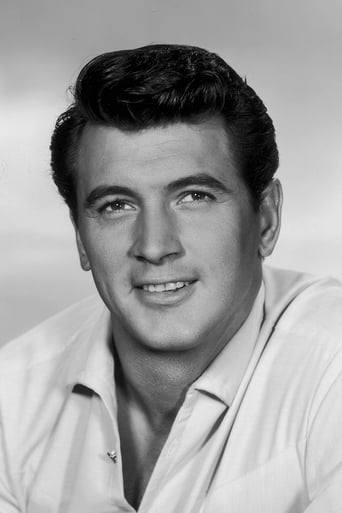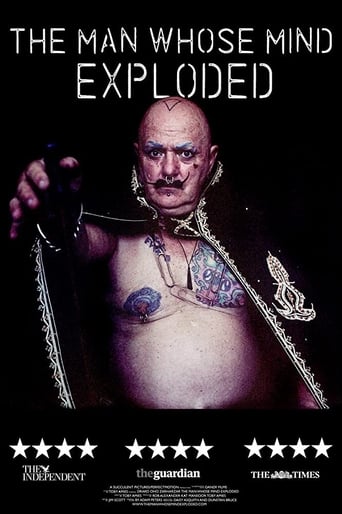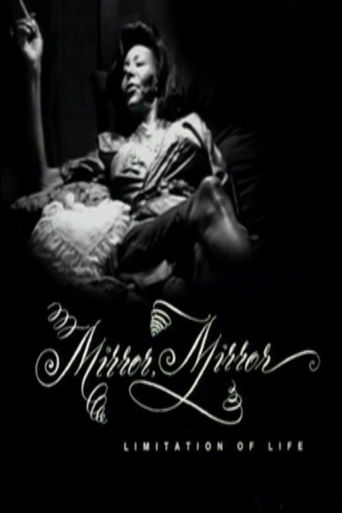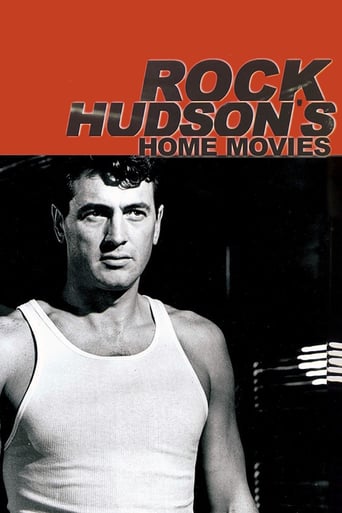
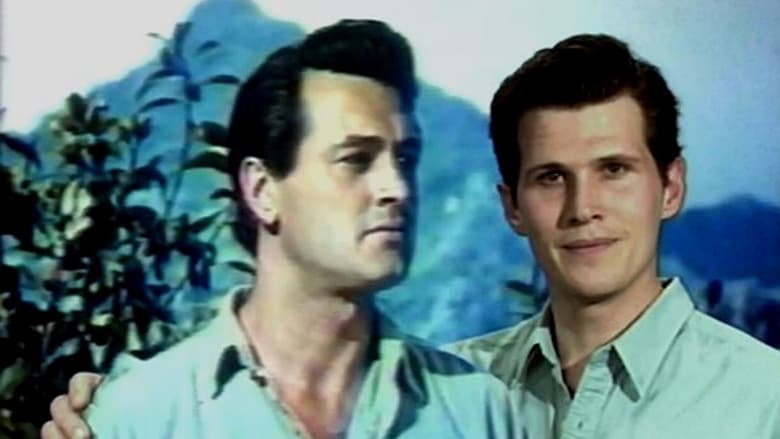
Rock Hudson's Home Movies (1992)
In this revisionist documentary, actor Eric Farr re-creates the character of Rock Hudson in order to take a look back at his films. It compares the actor's screen (and public) image with his real life and shows certain scenes, lines and situations in his films to insinuate that Hudson may have been gay.
Watch Trailer
Cast


Similar titles
Reviews
This is one man's adolescent self-involved riff of what he imagines to be all things gay hidden in the films of Rock Hudson, narrated as if he is Rock Hudson speaking in the first person. Criterion has inexplicably included this on the DVD & Blu-ray of "All That Heaven Allows", as if it's assumed the target audience for this film must have an arch camp sensibility that primarily appreciates Douglas Sirk (or Hudson or Wyman, or who knows? Agnes Moorehead?) from that angle. This is offensive and insulting to anyone who really likes this film or the people involved. It is disrespectful to the memory of Rock Hudson and a joke to gay people, film students, and any true lover of cinema. I used to think Criterion and others included supplementary material and audio commentaries of more abstruse scholars with the intention of being cutting-edge and providing an intellectual platform for further discussion. With "Rock Hudson's Home Movies" I wonder now if the purpose isn't just to include space for whoever can display the most spectacular masturbatory display towards the subject. There is nothing remotely intellectual or even intelligent in this supplement. Finally, I can't imagine who would actually enjoy watching this, outside of some stoned skateboarder steeped in "Cruising" while dressed in a poodle-skirt. Yeesh!
Rock Hudson's Home Movies (1992) ** (out of 4)Director Mark Rappaport has made some rather unique documentaries in his time. He basically takes a subject and twists and turns everything in order to fit whatever story he wants to tell. In this movie he plays the narrator, a person acting as if they're Rock Hudson, as the actor comes out and admits he's gay. There's no question that this documentary is going to upset many people and it's easy to see why. For starters, it's common knowledge now that Hudson died of AIDS and was gay. This documentary basically takes clips from all of Hudson's movies and twists the dialogue to make it seem that there were "clues" to this in all of his movies.I will admit that this is a rather well-made film and there's no question that the director is a talented filmmaker who knows how to edit and twist things in order to get what story he is going for. This film is a tad bit silly on one hand because it takes famous movies and takes things so out of context that it's hard to take it too serious. At the same time, twisting the movie's dialogue into fitting some other agenda is what's going to make people most upset.ROCK HUDSON'S HOME MOVIES isn't a complete success and as I said, I'm sure many will feel it cross the lines. What lines those are will be up to the viewer.
This amateurish documentary is a hodge podge of Rock Hudson's life and films cruelly twisting context and clips to suit the tedious narration. Some weird person pretends to be Rock Hudson speaking from the grave and then misuses the clips sought to prove whatever it is the narration has him speak. It is an awful documentary with creepy a host and a mean spiritedness about it all. The misuse of clips is particularly annoying. The terrible quality of the clips makes it worse. This doco is a disgrace. The truly galling thing one is left with is the shoddiness of the source materials and the overall tone of sleaziness is appalling.
During the late 50s and sixties, the critical world embraced a concept known as the auteur theory. As presented by the French, the theory suggested that some directors were the "authors" of their films because they, basically, left their fingerprints all over the finished films. Film scholars examined films frame by frame looking for repeated themes, philosophies, symbolism, tricks and trademarks that directors would utilize in storytelling. The auteur theory has some validity, as well as some drawbacks, not the least of which being the tendency to equate bad films with the good, to praise redundancy and similarities over innovation and variety and to celebrate the artist more than the art.The auteur theory was applied mostly to directors, sometimes to writers, occasionally to producers, but never to actors. The exception being -- sorta -- ROCK HUDSON'S HOME MOVIES. This ragtag documentary assembled by Mark Rappaport uses the methodology usually granted to studying directors to examine the various films of the late actor, not so much to grant him authorship status, but to look for cracks in the actor's closet door. Part scholarly research, part scandal sheet journalism, part trivia game, part student project, the film attempts to seriously examine Hudson's gay legacy and to ridicule his well-crafted screen image as the ultimate in heterosexual masculinity. The result is as creepy as it is scientifically unsound.Rappaport apparently scoured his video tape collection and the late, late show for snippets of film from Rock's movies that somehow could be interpreted as a commentary on Hudson's secret sex life. This hodgepodge of clips (presumably not legitimately acquired from their sources) is a collection of grainy, blurry copies of copies, often with equally bad sound. The film, however ambitious, doesn't look particularly professional. Even so, the effort is notable and the finished product cohesive. For an amateur film, it is thoughtfully crafted.And some of it is clever and amusing, especially, for instance, when Rappaport takes a look at the Rock Hudson/Doris Day romantic comedies of the 50s which frequently featured Hudson placed in dubious situations where his manhood and masculinity are brought into question. The gay man playing a straight man pretending to be a gay man seemed to be a joke shared by most everybody in Hollywood and with virtually nobody in the audience.Yet, there is something grimly dishonest and perhaps even mean-spirited about the film's attitude. Rappaport takes his snippets of film, dialogue and images and uses them out of context. Any mention of the word "gay," any reference to marriage, any interaction between Rock and another man is interpreted as having a homosexual subtext, even if that was obviously not the intent; the irony being apparent only in hindsight. Likewise, any reference to death is noted as a harbinger of AIDS, even if it is buried in a film made twenty or thirty years before Hudson's actually died of the disease. To say that Rappaport is reaching in some of his assumptions is an understatement; but he packs his innuendoes into tight clusters of montage, hoping that the viewer won't notice the weakness of his evidence.If the film were presented as merely an amusing trifle, with Rappaport's assumptions made with tongue firmly in cheek, then his questionable approach would be forgivable. But the film takes itself far too seriously, especially in presenting the narrative in the first person. On screen Hudson narrates through Eric Farr, an actor who doesn't look, sound or act in any way that brings the real Hudson to mind. Yet, he narrates the clips as though he were speaking as Rock, presenting Hudson as being bitter, condescending, snide and sarcastic. Quoting out of context or even paraphrasing is one thing, but to totally fabricate another man's thoughts crosses an ethical and dramatic line. Rappaport apparently thinks by having his opinions expressed as though they were really Hudson's that they would have greater credibility. But to use a distorted image of Hudson to criticize the way Hollywood distorted Hudson's image seems more hypocritical than inspired. And to assume that homosexuality should be obvious to anyone who watches for the clues is a bit homophobic, gaydar being far from an exact science.Clip films like this are not unusual -- Hudson hosted one such film on the career of Marilyn Monroe -- but generally the point is to celebrate the life of the subject. ROCK HUDSON'S HOME MOVIES presents its subject with a mixture of contempt and pity, seemingly equally angered by the way Hollywood used the star and by the way the actor allowed himself to be used. Rappaport tries to make us see Hudson's story as a tragedy: Gay man being oppressed into silence by homophobic society. But, even taking into account his well publicized death, Rock Hudson seems to have led a remarkably successful and rewarding life, maintaining his star status, earning critical respect and enjoying genuine admiration by the public and his peers, right up to and after his death. The one part he never seemed to play was martyr; this movie can't change that.


